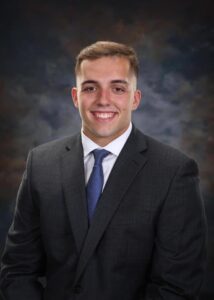This is part of a series of posts by recipients of the 2021 Career Services Summer Funding Grant. We’ve asked funding recipients to reflect on their summer experiences and talk about the industries in which they spent their summer. You can read the entire series here.
This entry is by Ryan Turlip, COL ’24
 This summer, I had the incredible opportunity of working as a clinical research assistant in the Department of Neurosurgery at Pennsylvania Hospital. The team that I worked with was led by Dr. Jang Yoon, and it consisted of several medical students, neurosurgical residents, and one additional undergraduate student. Dr. Yoon’s team was working on many interesting projects that all piqued my interest. Being that it was my first time participating in research, we agreed that I should begin with a single project to become acclimated to the research process, and then I could branch outwards and take on multiple assignments.
This summer, I had the incredible opportunity of working as a clinical research assistant in the Department of Neurosurgery at Pennsylvania Hospital. The team that I worked with was led by Dr. Jang Yoon, and it consisted of several medical students, neurosurgical residents, and one additional undergraduate student. Dr. Yoon’s team was working on many interesting projects that all piqued my interest. Being that it was my first time participating in research, we agreed that I should begin with a single project to become acclimated to the research process, and then I could branch outwards and take on multiple assignments.
At the beginning of the summer, the first project that I was assigned to work on was a clinical case series regarding a relatively new spinal fusion technique called lateral lumbar interbody fusion (LLIF). For this project, I helped compile a list of Dr. Yoon’s patients that underwent this procedure. Then, I reviewed each patient’s chart and recorded their comorbidities, operative information (ie. operative time, hospital length of stay, surgical complications, etc.) as well as other metrics and outcomes. Additionally, each patient completed a survey at their preoperative and postoperative visits which generates a pain score before and after surgery. This data is a substantial subjective outcome for each patient when compared preoperatively to postoperatively.
The LLIF case series consumed much of my attention for the first half of the summer. On the project, I worked with a medical student on Dr. Yoon’s team, and we conducted a statistical analysis on the completed dataset where we then drew conclusions from the results and began drafting a manuscript to share the findings of the project.
In addition to the LLIF project, towards the end of the summer I began working with the team on two other ongoing projects, one of which I was given a leadership role. One of these projects involved the use of augmented reality and virtual reality in the operating room and for preoperative planning. The project was a systematic review of dozens of publications on the topic with the ultimate goal of coming to a general consensus on the new technology. Not only did I learn the process of conducting a systematic review, but I was also introduced to novel surgical technology in its infancy that I believe will have a great impact on surgery in the coming years.
This summer opportunity immersed me into the world of research for the very first time and was an incredible experience. On days that I had free time, I was able to shadow Dr. Yoon in the operating room and clinical settings to gain exposure to the daily life of a neurosurgeon.
Further, I have gained a future mentor since I will continue to assist Dr. Yoon’s team and work on projects throughout this school year and hopefully future years as well. I am very grateful for my summer research experience and the help of Career Services since my position was unpaid. I learned a great amount from the experience, and I have now found a research team that I can continue with for the remainder of my undergraduate career.




